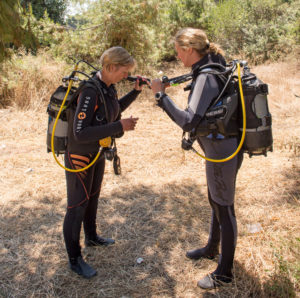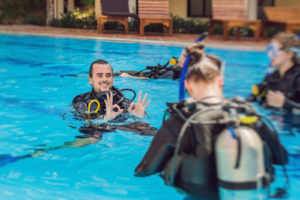Divemaster is typically the first professional level within the recreational diving industry. It's a multifaceted role that non-professional observers often misunderstand, and it's not uncommon during an open-water class for a student to proudly proclaim that they intend to be a divemaster. There are slight variations on the divemaster theme within each training agency and the role varies widely. Being both a great diver and a great divemaster does have some overlap but being a great divemaster is much more than being a great diver.
Becoming a great divemaster
There are thousands of divemasters. Many only remain active for a short time due to natural attrition. Some only complete the divemaster training to expand their knowledge and skill level or for the kudos of being a divemaster. Dive centers and instructors seek out only the best divemasters after they complete their training.
What are the characteristics of a great divemaster? If you're considering undertaking training, or are a new divemaster, how can you improve in those key areas?
Broadly speaking, sought-after divemasters exhibit a professional attitude and behavior. Their skills are buttoned up. In more detail, here's what to aim for if you'd like to gain employment as a divemaster.
Dive skills and knowledge
A divemaster must be not only competent in the water but also capable of diving to demonstration quality. This means having a clear understanding of — and the ability to perform — all core skills from each training course up to and including divemaster level. In addition, some of the skills are general ones that instructors would expect of any professional working alongside them, such as knot tying, deploying DSMBs or navigating on dives to allow the instructor to observe students. In addition, a divemaster should know the training standards and work within them, with a solid understanding of what is required and the integrity to abide by the rules.
How to improve: Practice makes perfect and the skills you feel most uncomfortable with are probably the ones you should concentrate on. Consult the instructor manual to ensure that you hit precise performance requirements and spend time honing your skills. Not sure how to tie that bowline? Are you a little shaky with compass navigation? Practice. Get familiar with training materials, standards and guidelines.
Personal fitness
Diving professionally can be very physically demanding and as such, there are minimum fitness requirements in place for divemaster training, including swimming tests, diver-tow tests and water-skills assessments. These are not a target for meeting the minimum requirements, but rather a gauge to assess where you fall in comparison to the ideal you should aim for – the highest level. The best professional divers see fitness as integral to their role, not as an afterthought.
How to improve: Make a balanced diet and regular cardiovascular exercise part of your normal routine. Being an Olympic athlete isn't necessary but having the solid fitness to deal with emergencies is.
Prioritize safety
Customers and employers want safety to be paramount in your mind as a divemaster. Practice what you preach. Plan the dive, dive the plan. Give the divers you're leading the opportunity to buddy-check. Brief carefully on dive parameters and entry/exit procedures. Ensure all the dives you're responsible for are executed within training parameters and safe limits. Customers need to feel safe with you and employers want to be sure their customers are in good hands. Don't push the envelope. Just because the divers you're leading have an advanced open-water certification doesn't mean you should always aim for a maximum depth of 100 feet (30 m). Use good judgment and conservatism when leading dives based on conditions, ability and comfort.
Similarly, when working with new divers in-water always be in a position to offer immediate physical assistance. Especially on descents and ascents, assess the divers' skill level and use appropriate control criteria. Follow the safety procedures as dictated by the environment you're working in. Work in collaboration with the captain of the boat or local trip leaders to keep your customers safe.
How to improve: Pay attention to more experienced instructors, divemasters and boat captains you may be working with. You can always learn something from them. Know your dive sites and be mindful of local diving laws and regulations. Stay abreast of the standards of the training agency and dive center you represent and make conservative decisions.
Know your divers

Conducting buddy checks is vital
Crossing that invisible line and becoming a divemaster means the diving is no longer about you. Rather, it's about the divers that you're leading — whether that's pool-refresher session, try dive, guided dive, or indirectly supervised training dive. Learn how to read people and situations as you gather experience. Your assessment of the divers begins the moment you meet them at the dive center, boat or resort. Each word and gesture can tell you something about the diver's likely behavior in the water and, therefore, help you make a better decision about how to tailor that pool session or guided dive to them. Always plan your dive to the least confident, skillful or experienced diver in the group.
How to improve: Learning how to assess divers and judge situations isn't something that happens automatically as you qualify as a divemaster — it takes time and experience. Pay close attention to your divers and listen to other, more-experienced professional divers. Ask them why they're making certain decisions and, if in doubt, choose conservatively.
Have the right equipment
Being a professional diver means having reasonably up to date, well-serviced equipment that is right for the job. It doesn't necessarily need to be box-fresh, but it shouldn't be in poor condition, out of date, or held together with cable-ties and tape. Conversely, if you're about to take in a group of newly certified divers on a simple guided reef dive, you needn't wear a rebreather, twin-set or multiple stage bottles.
An important psychological aspect of being a good divemaster is to mirror your customers as much as possible and make them feel at ease. Have the core equipment to undertake the job — as specified with the training agency's standards — together with anything specific to the environment you'll be working in.
How to improve: Research the environment you'll be working in to ensure you have what you'll need. Plan ahead and budget for any new equipment. Build in contingencies such as backup computers, spare masks and a second DSMBs and reel for emergencies.
Expand your experience and knowledge

Helping instructors during pool sessions will increase your skills.
Continue to learn and hone your craft. Follow your interests and take continuing-education courses and specialty training that piques your interest. Learn about different areas of diving and gather experience in different environments. Some divemasters complete their training solely on a warm Caribbean reef but would be unsuitable to work in a more challenging, cold water, low-visibility environment of a European lake. Conversely, the divemaster who has worked only in the European lake would be unsuited to guide a dive in strong, swirling currents in southeast Asia. And simply diving in those different environments on holiday or vacation isn't enough. Watch closely how and why the local divemasters set up, brief and run dives in a certain way; why the boats remain in a certain configuration, where the team stows safety equipment, and what the local procedures are.
How to improve: Broaden your skill set and consider each dive trip a learning experience, not a vacation. Take a notepad and slate. Observe and ask questions. There is always something to learn from environment to environment that will make you a better and more rounded divemaster.
Attitude
A good attitude is arguably the most important trait of a great divemaster. As a result, you can be the most skillful diver on the boat but if you've got a bad attitude you'll never succeed. Going the extra mile really separates the great divemasters from the average ones. With that in mind, great divemasters:
- Never have a bad day or a bad dive. Good divemasters are always on time, prepared, well-rested and ready to go.
- Collaborate with instructors on training courses. They've also researched the course curriculum and have considered where they should be in the water, and what their logistical role may be on land.
- Appreciate that dive preparation happens well before getting in the water. They fill tanks, load equipment on the boat and complete paperwork. This is all part of a team effort to offer customers a good service and get the job done.
- Understand that they're part of a larger team working with the dive center to offer a professional service. A great divemaster also has skills such as website/marketing prowess, equipment maintenance and sales skills.
- Can communicate with honesty and integrity to customers and other staff members, promoting the business they work for.
- Have excellent interpersonal skills and can nurture trust and respect in customers and fellow staff members.
How to improve: A good attitude is part nature, part nurture. Above all, a great divemaster will consider the bigger picture of the dive center they're working for and the industry they're part of.
Passing your divemaster training is the foundation of becoming a great divemaster, not the finish line at the end of the race. Hone your skills, professionalism and attitude and you'll grow into a valuable member of the dive team.
The post Training Fundamentals: Becoming a Better Divemaster appeared first on Scuba Diver Life.
from Scuba Diver Life http://bit.ly/2GAWD1f
No comments:
Post a Comment